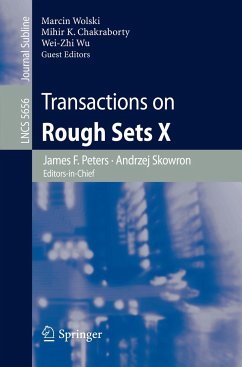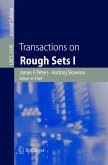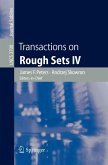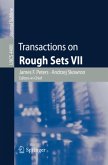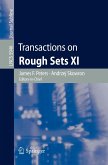The LNCS journal Transactions on Rough Sets is devoted to the entire spectrum of rough sets related issues, from logical and mathematical foundations, through all aspects of rough set theory and its applications, such as data mining, knowledge discovery, and intelligent information processing, to relations between rough sets and other approaches to uncertainty, vagueness, and incompleteness, such as fuzzy sets and theory of evidence.
This book, which constitutes the tenth volume of the Transactions on Rough Sets series, provides evidence of further growth in the rough set landscape, both in terms of its foundations and its applications. The 8 papers presented in this volume focus on a number of research streams that were either directly or indirectly begun by the seminal work on rough sets by Zdzislaw Pawlak for a number of research areas such as entailment and approximation operators, extensions of information systems, information entropy and granulation, lattices, multicriteria attractiveness evaluation of decision and association rules, ontological systems, rough approximation, and rough geometry in image analysis.
This book, which constitutes the tenth volume of the Transactions on Rough Sets series, provides evidence of further growth in the rough set landscape, both in terms of its foundations and its applications. The 8 papers presented in this volume focus on a number of research streams that were either directly or indirectly begun by the seminal work on rough sets by Zdzislaw Pawlak for a number of research areas such as entailment and approximation operators, extensions of information systems, information entropy and granulation, lattices, multicriteria attractiveness evaluation of decision and association rules, ontological systems, rough approximation, and rough geometry in image analysis.
From the reviews:
"One of the main objectives of rough set theory is to find reasonable extensions for rough sets in known techniques and results about sets. ... I highly recommend this book to students and researchers who are already familiar with the basic ideas of rough set theory and want to learn about the latest developments. In principle, the book should also be accessible to other readers with a mathematical background, even if they are not very familiar with rough sets." (V. Kreinovich, ACM Computing Reviews, November, 2010)
"One of the main objectives of rough set theory is to find reasonable extensions for rough sets in known techniques and results about sets. ... I highly recommend this book to students and researchers who are already familiar with the basic ideas of rough set theory and want to learn about the latest developments. In principle, the book should also be accessible to other readers with a mathematical background, even if they are not very familiar with rough sets." (V. Kreinovich, ACM Computing Reviews, November, 2010)

